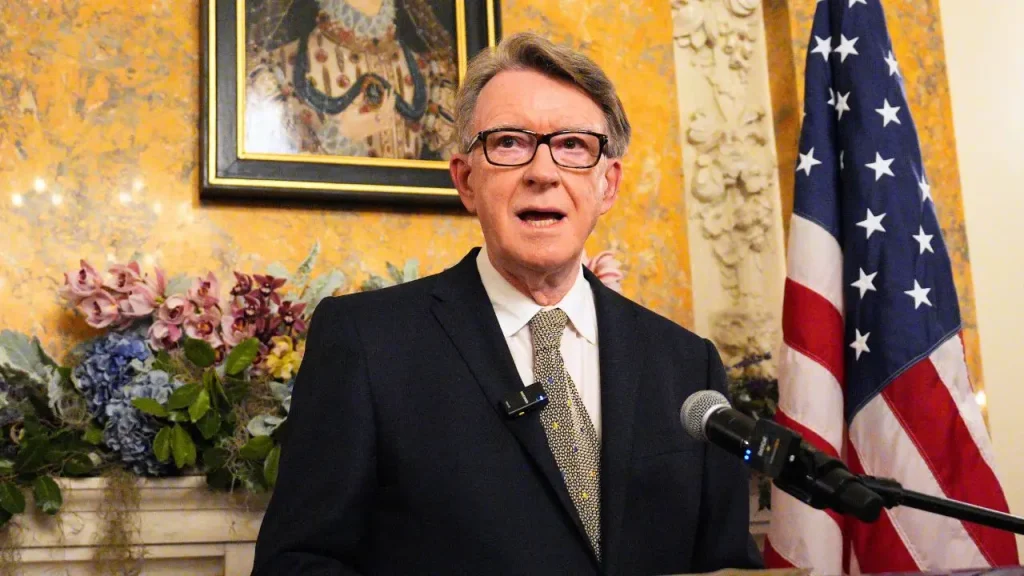British Ambassador to the U.S. Fired Over Epstein Connections
In a stunning turn of events that has rocked Anglo-American diplomatic relations, British Prime Minister Keir Starmer has dismissed Peter Mandelson from his position as the United Kingdom’s ambassador to the United States. The dismissal came after The Sun newspaper published a series of emails revealing that Mandelson had maintained a significantly closer relationship with convicted sex offender Jeffrey Epstein than had previously been disclosed. These revelations have not only ended a distinguished political career but have also raised serious questions about judgment and transparency in high-level diplomatic appointments, creating ripples across both British politics and international relations.
The emails, made public on Wednesday, paint a troubling picture of Mandelson’s relationship with Epstein dating back to 2008, when the latter was facing his first conviction for soliciting prostitution from a minor. In these communications, Mandelson expressed considerable sympathy and support for Epstein, even encouraging him to “fight for early release” through legal appeals before Epstein began serving his 18-month prison sentence. Perhaps most damaging was Mandelson’s personal message to Epstein: “I think the world of you.” These expressions of support and friendship came at a time when Epstein was being sentenced for serious sexual offenses involving a minor, making Mandelson’s encouragement particularly problematic for someone holding a position representing British interests abroad. The timing of these revelations could hardly have been worse for Mandelson, coming shortly after he had represented the UK in high-profile meetings with President Trump in the Oval Office regarding US-UK trade negotiations.
Foreign Office Minister Stephen Doughty addressed the situation in the House of Commons on Thursday, acknowledging that the prime minister’s decision was directly related to the newly published correspondence. “In light of the additional information in emails written by Peter Mandelson, the prime minister has asked the foreign secretary to withdraw him as ambassador,” the Foreign Office stated. The official explanation made it clear that the dismissal stemmed from the fact that “the depth and extent of Peter Mandelson’s relationship with Jeffrey Epstein is materially different from that known at the time of his appointment.” This disclosure came on the heels of an equally damaging revelation from the previous week, when Democrats on the U.S. House Oversight Committee released a 2003 birthday album compiled for Epstein in which Mandelson had referred to the disgraced financier as “my best pal” in a handwritten note, further cementing the impression of a close personal friendship between the two men.
The political fallout was swift and devastating. Opposition parties across the spectrum united in their calls for action, with Conservatives and the Scottish National Party demanding Mandelson’s immediate resignation, while the Liberal Democrats pushed for a comprehensive investigation into the matter. The cross-party consensus on the inappropriateness of Mandelson’s position made his continued service untenable, leaving Prime Minister Starmer with little choice but to act decisively. The scandal has been particularly painful for the Labor Party, given Mandelson’s historical significance as one of the architects of its modern identity. Known as a key strategist in the party’s transformation and electoral success in the 1990s, Mandelson had been central to Labor’s rebranding as “New Labor,” working closely with former Prime Ministers Tony Blair and Gordon Brown to modernize the party’s image and policies.
Mandelson’s career had been marked by remarkable resilience and a series of prestigious appointments. After serving in senior Cabinet posts, including as trade secretary and Northern Ireland secretary under Blair, and later as business secretary under Brown, Mandelson expanded his influence to the European stage, serving as the European Union’s trade commissioner from 2004 to 2008. His elevation to the House of Lords as Lord Mandelson in 2008 cemented his place in Britain’s political establishment. His appointment as ambassador to the United States had been seen as the capstone to a distinguished career of public service, making his abrupt dismissal all the more dramatic. The ambassador’s role is particularly significant in the context of the “special relationship” between the UK and the US, a diplomatic partnership that has been central to British foreign policy for decades.
This scandal emerges against the backdrop of ongoing revelations about Jeffrey Epstein’s wide-ranging connections with prominent figures in politics, business, and society on both sides of the Atlantic. Epstein, who died in prison in 2019 while awaiting trial on sex trafficking charges, has become the center of a web of associations that has tainted numerous public figures. For Britain, the Epstein scandal had already touched the Royal Family through Prince Andrew’s well-documented association with the convicted sex offender. Now, with Mandelson’s dismissal, the scandal has reached into the highest echelons of British diplomacy, raising uncomfortable questions about judgment, vetting procedures, and the potential for compromised relationships at the heart of international relations. As Prime Minister Starmer moves to appoint a new ambassador, he faces the challenge of restoring credibility to this crucial diplomatic post while managing the political fallout from a scandal that has exposed troubling connections between power, influence, and proximity to a convicted sex offender.















